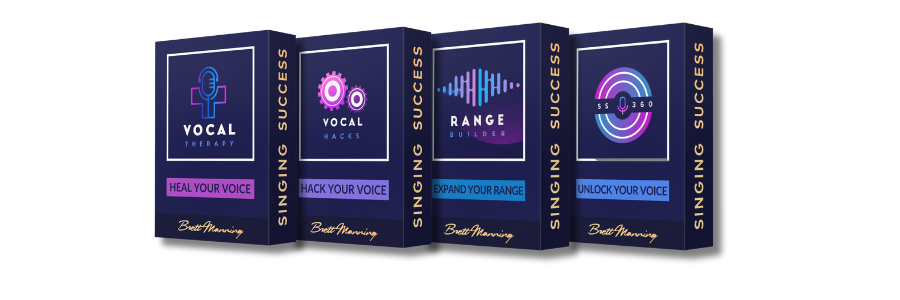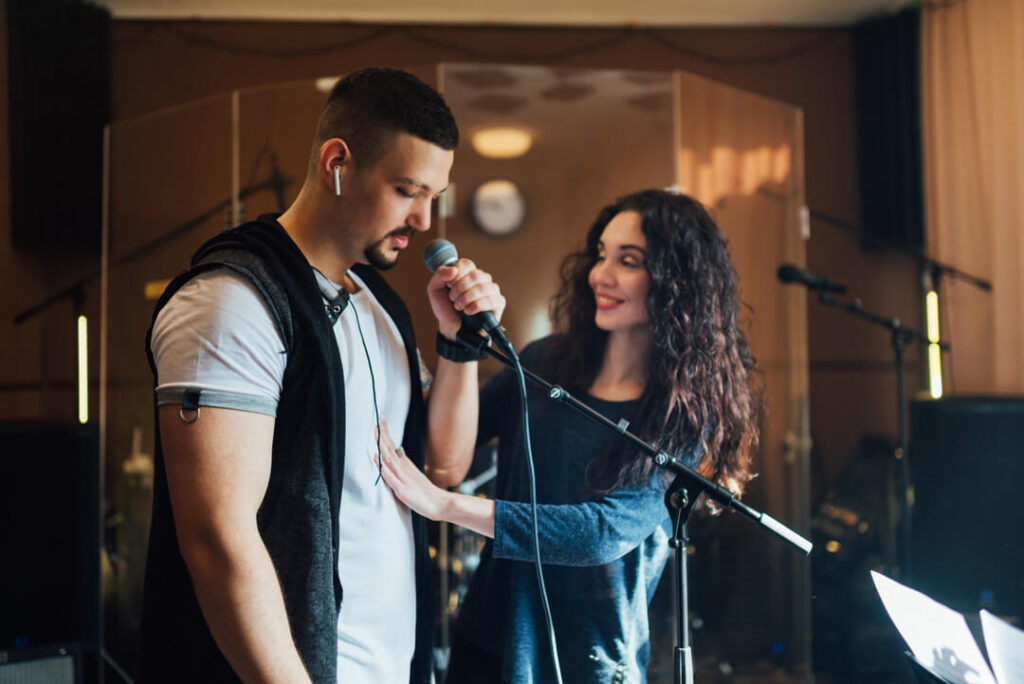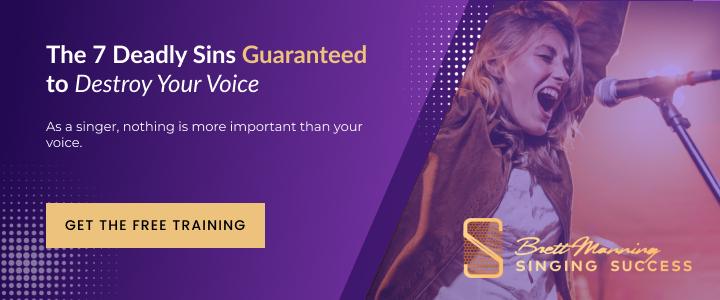Before I start, I want to quickly address a few common concerns and replace those concerns with strategies. Here are a few of them:
- I want to sing, but I don’t really know the VERY FIRST step. The most obvious answer might be: find a vocal coach and start vocal training. But it’s NOT! The first thing is to acknowledge you’ve been singing all your life and no one had to teach you how to follow along with your favorite singers on your radio, playlist or favorite records on CD, MP3 or vinyl records (for the collector of nostalgic sound). Enjoy singing without fear, but sing easy songs until you can get private singing lessons or start with an online singing course.
- Can anyone sing?- In my blog titled “Can Anyone Learn to Sing,” I dispel the popular myth that natural singing talent is needed, whether you’re going to sing as a hobby or have a successful singing career. The equalizer is found in vocal coaches who know how to unlock the trickiest areas of your voice.
- What if people laugh at me or mock me?- I have so many singers who’ve dealt with this valid fear throughout the decades. But guess what? Some people will hate you, even if you give them a brand-new convertible Mercedes. Others will love you, even if you’re obnoxious and self-centered. For the healthy person, realize that your goal should be to get as good as you can get and then seek out an audience….once you have the confidence. The more confident you are, the less you care what your critics say.

Fast-Track Your Success!!

VIP Membership includes:
- Exclusive Facebook Group
- Interact with our vocal coaches–ask them YOUR question
- Live warmups
- Masterclasses and Q&As with Brett Manning and his guests
- SS360 QuickStart Program
- SS360 – The FULL Systematic Vocal Course
- Vocal Hacks
- Range Builder
- Mastering Mix
- Mastering Harmony
- Mastering Vibrato
- Vocal Therapy
- Plus…exclusive content only found here all along the way!
You can struggle on your own, or you can get direct access to the Nashville Coaches who have launched some of the biggest names in the music industry.
Benefits of Singing Lessons
There are 2 types of athletes and artists–trained and untrained. First, I don’t want to knock those who have ‘natural’ talent and have had little or no training. Those that experience success in sports or the arts—with no training—are pretty rare and eventually they will hit a wall. Remember this…
“THERE IS ONLY SO FAR YOU CAN GET IN LIFE LEANING ON YOUR OWN LIMITED WISDOM AND UNDERSTANDING.”
It turns out that nearly all professional singers, pro athletes, dancers, painters and gymnasts have had serious training.
If you wanna rapidly become a singer, here’s what to expect from voice training:
RATES– Range, Accuracy in pitch and rhythm, Tone quality, Endurance (reducing strain on the voice) and Style.
Range
When it comes to vocal range, every singer will be limited by how low and how high they can sing. The music business will often look for those with extraordinary voices to decide if a singing career is in their future. Our technology (techniques) for achieving high notes is very different from typical lessons.
First, gently warm up the voice using humming style exercises. We start with…
Chest voice- the deeper, speech-like voice that primarily resonates against your chest externally and is amplified and projected in the hard palate… or roof of the mouth.
Then we allow the vocal cords to adjust by subtle stretching until the more difficult areas of the vocal range, where a zipping up action is encouraged by using less air through what are called ‘semi-occluded’ exercises like tongue trills, lip roll or trills, singing through a straw or a muffled oh sound. Also, vocal fry, which must be done right and with a purpose of reducing excess tension off of the voice in order to ‘discover’ rather than ‘force’ high notes. This helps to extend….
Head voice- which primarily resonates in the head cavity internally, and resonates (vibrates) against top and back of the head for the highest notes. This lighter, higher tone can be mistaken for falsetto, which is generally airy (breathy) and lacks depth of tone and richness of resonances. Also, it tends to be disconnected from chest voice or what some have termed as ‘full voice’. The voice between head and chest has often been called ‘middle voice’ or more popularly….
Mixed voice- This voice is a true blend of head and chest resonance. It’s described as heavier than head voice, but lighter than chest voice. It’s also the most elusive, yet engaging coordination that most singing styles demand. If you want to become a singer AND start a singing career, you’ll need a well-trained, strong, consistently reliable mixed voice.
This is one reason my ground breaking course—and first of its kind—titled Mastering Mix was an international success and has been used by Franco Fussi (Andrea Bocelli’s ENT or throat doctor) to rehab injured singers. His research included before and after photos of the vocal cords, as well as before and after recordings of damaged voices that were making healthy, effortless tones after using Mastering Mix.
Mastering Mix is the truest way to extend your range without:
Flipping into falsetto- this is a protective measure to avoid strain, but only allows minimal range extension, because the tone will grow progressively more airy which will add another kind of tension that prohibits high notes. This can be used for style, but habitual use will cause an eventual degrading or at worst, deterioration of the voice.
The extreme highs of the voice is called whistle voice (my vocal coaches and I have taught 1000’s of singers to sing in whistle voice.).
Whistle voice- literally sounds like someone is whistling with their lips, but it’s the vocal cords making a very narrow opening via ‘dampening’ or a ‘zipping up’ to produces the highest possible pitches. These were made famous by Mariah Carey, but most divas—and even a dozen or so guys—can now produce this crowd pleasing, astonishing sound!
Overall, Singing Success VIP members will have all the tools to trick, then train their voice into these elusive coordinations. VIP members automatically have access to my Range Builders course, which radically extends the average range on the bottom and top to equal more than an octave and sometimes up to two octaves.

Accuracy
Pitch accuracy is rarely natural. Especially on your own. Every music producer ends up using pitch correction tools like ‘auto tune’ to fix bad performances. But if you REALLY wanna become a singer songwriter or just a good karaoke singer, remember this… pitchy singing or out of tune sing can ruin a great song.
Being able to sing simple melodies still takes a great ability to ‘locate the note’ with your vocal cords. This is very easy, once you’ve developed your ear and coordinated your voice using exercises that even a *4 year old can perform.
*(I used to do silly, easy exercises with my kids when they were only 2 years old. More accurate would be to say they would overhear me teaching Skype sessions from home and start doing the exercises. My first child did them at 9 months old….true story!)
As melodies become more complex, if you really wanna become a singer—especially a successful singer—you have to get the training or a training course that grows with you.
For example, If you check out my best selling Singing Success 360 course, you’ll hear vocal exercises that progressively get more difficult with each following lesson.
But know this immediately: Tone deafness is a myth!
The great difficulty is not whether you can hear the pitch or not, but how do you coordinate your voice to the pitches you hear?
This problem can be handled rapidly with me or any one of my talented vocal coaches. One on one is definitely the fastest route to fixing pitch accuracy issues.
Accuracy if rhythm or timing can also be solved rapidly as well. Some of my students have taken online drumming courses just to get the feel of rhythm. Singing scales that have been precisely played to a beat or metronome will also help develop rhythm.
Also, if you’re ever blessed to work with elite music producers, get cast in a musical theatre production or get a paid vocal performance, you will DEFINITELY need to learn to sing with a band or instrument.
Many professional singers spend just as much time learning rhythm as they do training their singing voice.
To have a respectable singing career, this is one VERY crucially needed ability. Also, many singing competitions have truly been decided by who sang on key. Style and tone are useless if your accuracy is horrible.
*Another additional help outside vocal training to to learn a few musical instruments. Piano and guitar can be beneficial to your ear and musical confidence.
Tone Quality
I could literally write a lengthy book on tone quality. This is one of the distinct factors that make you ICE:
Intriguing- This is the voice that sounds different from other singers. Often marked with a mystique. Usually these type of singers write songs using unconventional chord progressions and haunting or quirky melodies.
Captivating- These are the voices that have such stunning tone quality, such rich tonal color, great dynamics, extraordinarily beautiful, or even reckless. This is a defining principle of nearly every famous singer. The professional singer songwriter who knows the music business well, also knows that your own music must reflect your voice. This is why I encourage, mentor and find other mentors to help my vocal students learn to write songs.
Emotional- Just like the captivating tone, you also will benefit from writing songs because you are more emotionally attached to the message. I’ve lost 2 brothers from cancer. There’s a song I wrote about my older brother who was gone FAR too soon…. 49 years old. The word ’emotional’ does not begin to describe how I feel AND what I project in my tone. In fact, here’s a worthy principle regarding tone quality and emotion:
“Tone quality does NOT build emotion into the voice as much as emotion builds tone quality!”
Vocal technique should build resonance in the chest, head and mixed voices as we spoke about in range building. However, in regards to tone, these qualities must be pleasing to the ear.
HOWEVER…
Pleasing doesn’t necessarily mean pretty. Those are typically choir, opera or musical theatre voices. But not many singers are accused (interesting choice of word right 😮) of having pretty voices. We usually say “nice voice, amazing voice, great singing style, killer power, cool voice” if….you’re singing in the commercial music industry.
Finding your natural ‘speech like’ tone (a term I use often) is very necessary to externalize your distinct personality into your music.
Most singers on the radio can be immediately identified with certain tonal characteristics, including an edgy tone, breathy sound, raspy, bright, dark, nasal, de-nasal or dynamic tone.
So, if you wanna become a singer and you’ve always loved singing, perhaps you need to let go of the limit you place on your talent. NO ONE knows how good you can get until you work at it. This also means doing the ‘right’ work. Not all vocal exercises are created equally!
Furthermore, background singers can take solace (comfort) in knowing that…. if you want your voice heard but don’t wanna be a lead singer, there is great joy in bringing your golden tone quality to the overall mix to the final sound of the song. Your own singing on your own songs (in the background) makes for a perfect blend. Almost no one blends better with you….than you…or a sibling. Although…sometimes diversity of tone blends in a more interesting manner.
If you wanna sing professionally or be a lead singer in local band, the best thing to do is start today. Don’t delay! A caring vocal coach can make ALL the difference if you wanna become a singer!!!
Endurance
The year was 1994 and I had just moved back to Utah from my 6 month stint of vocal study with Seth Riggs in California.
I’d been teaching part time starting in 1988 or so and full time in 1991. Unsatisfied with my occasional trip to L.A. to study with THE master voice coach of our generation, I had to move there and observe, study, practice, spend ALL my savings (including those from the sale of my beloved upright grand piano 😭), borrow more from my parents, play piano and guitar every day, bounce around doing karaoke to build my confidence, dive into other methods I’d been curious about (most of them of very little value, some of them harmful via taking lessons from other renowned coaches), and….(deep breath) physically get in the best shape of my life.
When I moved back to Salt Lake City—where I’d stay until June 3rd of 1998, the date I moved to Nashville and have remained every since—I immediately lit back into many of my old clientele and did an advertising blitz that simply stated….
“I’m back! And I have a bunch of vocal tricks and secrets with me!”
A girl who was an old friend had worked with my first teacher with little results. I told her I could fix what was wrong.
She came and took a lesson with me after complaining of poor vocal health.
Her breakthroughs were IMMEDIATE!!! Even surpassing my own expectations. Floating to the high notes with no throat tension or strain. And… falling into her power like running downhill (part of my ‘trick’ of vocal release) and discovering her TRUE singing voice for the first time ever.
Up until now, she’d always though that confidence was for ‘other singers’ and that she was ‘just a’ try-er and not a doer. No hope at all. She took the lesson to indulge me.
Through her rich range of emotions, she said something that I would go on to hear from 1000’s of singers studying with me or using my Singing Success courses. She said…
“Hmmm 🤔…. my voice doesn’t hurt”.
Nearly every ‘already’ famous singer I coach will usually come to me because if they don’t get help, their singing careers will be short lived.
The higher the level, the trickier singing becomes. If you REALLY wanna become a singer, know that a successful singer is a consistent one.
If your end goal is to start a singing career, whether as backup singer, someone winning singing competitions or to be a famous singer, you have to remove these 3 things:
Strain- Yelling on pitch, pushing your voice too hard or doing anything that makes singing more difficult, could compromise your goal to become a singer that people enjoy listening to.
Inconsistency- Bad technique, bad nutrition, out of shape vocal cords, lack of sleep, vocal abuse or simply not ever utilizing an effective vocal coach.
Excuses- An amateur or beginner who truly wants to become a singer MUST remove excuses like:
“I’m not capable of anything great, this is too hard, it takes too long.” Or “I’m not naturally talented, I’m tone deaf (not a reality), there’s too much competition.”
Successful people look at their goals, dreams and desires, roll up their sleeves and go to work… with no excuses!
Successful people are NOT lazy. They are beyond being merely motivated. They are driven.
Whether you want a singing career on the big stage, join some singing troupes, or just singing jingles, you need to work to be the best version of yourself.
Finally, it’s not about perfection, but direction. Be interesting. Believable. Transcend perfection by being convincing, passionate and exciting!

Developing Your Singing Skills
I have 2 real strong short cuts for the developing singer! This is almost too easy for the true learners who describe themselves as resourceful. I’ve done the heavy lifting for you so you don’t have to take forever to ‘figure it out’.
Get a Vocal Coach
A great coach will be your champion, your mentor, your ‘vocal hacker’ who can find areas in your voice that may feel elusive on certain days.
But there’s two main goals for an effective coach. First is to teach and enhance your overall skill level. Second is to inspire you, undo negative beliefs, build you up, and turn you into a true performer!
Fortunately, I believe that I have assembled the best of the best coaches in my Nashville studio—as well as many other associates world wide—who have a track record to developing incredible control, tone quality and vocal health.
Also, these coaches all have strong ‘musical aptitude’ so they truly know how to get you to make the right artistic decisions in your singing. Showing you multiple paths to singing the same song can be an effective game changer.

Get a singing Course
One difficulty could be that you really wanna get confident and possibly even pursue a singing career, but you know you don’t have enough in the bank account!
This is why I created Singing Success many years ago. It was my goal to give you a diversity of vocal exercises and techniques to keep you busy for a very long time.
Well….. the results are in!!! And…. if you’ve been following us for a while, you’ve seen how zealous our successful singers are for using Singing Success’s various courses for decades.
On top of that, we created a community of like-minded ‘successors’ who are going through each course and sharing their results, struggles, victories, discouragements and breakthroughs with each other singers. This community gives you constant access to my coaches so you can get the latest breakthrough techniques as we continue to research and develop new methods that expedite your results.
Plus, this community will also give you access to our coaches to get your questions and biggest struggles addressed immediately with our “coach of the day,” who is found in our online private Facebook group.
Additionally, there’s weekly warmups that give you various road maps or workouts and warmups to help you get the industry edge that all stars have used to get where they are today!
This community that gives you streaming access to all my courses—the largest vocal exercise/ vocal lesson library on earth—is called The VIP Membership! And…. it’s a super affordable subscription based program that puts you in a type of singing university to improve as fast as your desire allows you!
Also, if you haven’t already, plow through all our fantastic blogs to get more specific knowledge on vocal development!

Getting Started with Singing Lessons
In 1998, I moved to Nashville from Salt Lake City, Utah. I gave up 130+ clients (sort of… I often went back) and would often teach 40 to 60 hours a week.
In a smaller music market, I had built up a reputation as the man who could “see inside your voice with his ears.” This is strange description of a vocal coach, but the fact was that I was able to hack voices quickly, so many struggled less and less and singing would increasingly become more enjoyable.
So imagine moving to Nashville where virtually NO ONE knew me.
I immediately launched an ad campaign in a local arts newspaper that simply read “Speech Level Singing Lessons: Fast, Reputable and Effective.”
My first month, I had about 3 or 4 students. Every couple of months my student load doubled because people were talking.
Within 2 years I had built up a client list with the likes of 10 Grammy Winners, Mark Kibble and Claude McKnight of Take 6. I coached Keith Urban and a host of other Christian/gospel artists.
In the summer of 2000, I held a vocal boot camp featuring the above mentioned artists as well as industry giants. This event was a huge success.
But the tricky thing was that I later learned that a large number of known singers had thought about working with me but were intimidated and thought I wouldn’t work with anybody who wasn’t sent by a label or manager.
None of this was true. Although today, I typically recommend my associates because I’ve shifted a lot of my focus and am teaching much less. However, I’ve made myself available to career minded singers and those with a distinctive need for my specialization.
But know this…. most teachers (including myself) will happily teach those with a passionate desire to build their voices.
Finding a Good Singing Teacher

This has become a fine art and most aren’t really sure what they’re looking for. Here are just a few of some crucial qualities for a person just getting started… the 4 T’s of teaching.
Track Record
What have they accomplished? This doesn’t necessarily mean that they need a roster of Sony, Capitol and Atlantic recording artists. Although, reviews often speaks volumes. However, this could also mean that they have transformed enough voices (who aren’t in the music industry) to demonstrate that they know what they’re doing.
If a coach has a dozen singers who proclaim that they are the result of their training, just remember…. where there is smoke, there is fire. Also, singers love to show off for their coaches. Not in an arrogant way, but in a manner that shows gratitude for what they learned.
Training
What kind of teacher training has the coach received? Whether from a university, a conservatory or official certification from a reputable teaching method or coach, they shouldn’t be flying solo.
In fact, the better your coach can trace his lineage of teachers, the more effective they will be at communicating effectively and concisely.
If their description is nebulous (cloudy or unclear), then perhaps they’re flying solo with no type of training to validate WHY or IF they should be teaching.
Another example is martial arts. Imagine going to learn Karate, Jiu Jitsu or Kick Boxing from an instructor with NO belts—yet alone a black belt—and they tell you to trust them. You find out that they have ‘come up with their own system’ and that all methods before them were wrong. This is extremely common and unfortunate in the teaching world.
*Be very suspicious of those who’ve been teaching for a limited time and now have method named after themselves. This is often a marketing method with little or no substance. Ask to describe how they ‘developed’ their ‘own’ method, there won’t be much to talk about.
Talent
No matter how much training, technique, experience and knowledge a coach has, they should also possess a degree of talent that can be admired. To be sure, I’ve had lessons with teachers who were unable to sing well and even had damaged voices, but they possessed an uncanny instinct that allowed them to rapidly diagnose and correct vocal issues.
Typically, a teacher who can still somewhat sing or at least has had experiences singing well and/or performing, will also demonstrate a wisdom from having been in the industry.
I once had a person come to a lesson with me showing me excerpts from one of my online singing course competitors. This particular gentleman would explain an exercise then go on to demonstrate the exercise. Sadly, no one note in the scale he was attempting to sing was on pitch. Eventually, his sales ceased. If your method has no foundation, it will crumble. I’m grateful for more than 3 decades of teaching successful singers.
Technique
Not all techniques are created equally. It’s important that the technique the coach uses is reputable. The reasoning behind how the method works should capture your attention quickly.
AVOID fakes who just happen to be talented singers looking to make some extra cash. Many teachers I’ve met had literally NO idea what they were doing. Many of them admitted that they were just having the singers sing with them and had one identifiable technique. This is why I’ve posted in the past, this important refutation of ‘fake’ teachers.
YOU DON’T GET TO GUESS WITH OTHER PEOPLE’S CAREERS
What to Expect in a Singing Lesson
A lesson can be in person and often should be when convenient. However, my associates and I have trained 1000’s of singers via Skype, Zoom or FaceTime and have managed amazing results. Here’s a few things to take away the fear factor of a lesson or coaching session:
You Don’t Have to Read Music
I think it surprises a lot of industry outsiders to find that most music producers don’t read music. They typically know the cords and then create an arrangement out of these chords. In fact, pop, rock, country and other commercial music fields involve strumming chords on guitar or playing chords on a piano or keyboard and singing the melody on top of these chords. Complexity can come later.
Also, when singing cover songs, it’s fine to sing along with the original artist or use a karaoke track in the beginning. It’s more important to learn how to produce the best possible tone. Musicality can be picked up quite naturally as you begin to learn songs.
It’s more important to warm up, coordinate and build the voice first.
A standard voice lesson will include a series of scales on certain vowels, consonants, or even words. Traditionally, we usually think of warming up the voice on the sound ‘la-la-la-la-la’ and so on. But today, there’s a 1000 varieties of exercises used to get a desired result for each singer.
Also, these lessons can be in a self-guided course. This can often be helpful to those who prefer the safety of being self-taught, at least in the beginning stages.
For best results, singers should do both. The more learning we engage in, the faster we can reach our goals.
Finally, the best time to start anything you dream of doing is…. NOW. Even if you’re starting at a such a young age.
Technique should make your voice pleasing to listen to, but singing is different.
First, build your voice. You can sing with the radio or your favorite singers on a playlist any time you want. Singing songs is what truly makes you more musical. But lessons are for building functional voices so you can sing the difficult songs that have eluded you thus far.
True singing is applying your voice technique to a song and learning rhythm and style.
Once you have this technique, a trained coach will know how to walk you through each melodic phrase of a song.
At my studio, we teach lyric memorization techniques, show you the type of trills, licks or runs that can make you more soulful or interesting. Then, we develop your performance skills. Confidence on the stage is the final goal!
It’s ok to have bad days.
If all singers got discouraged from a lesson or performance that was horrible, we would all quit. Bad days will occur. The goal is to get coaching to learn how to pull yourself up out of your worst singing days.
Coaching is for consistency.
Most of us are guilty of making the following quote a universal truth:
“Human beings are the only animals that run faster when they get lost!”
The humble ability to stop, look around and ask yourself the honest question “How did I get here?” is huge benefit to singers or anyone in any endeavor.
The answers are sometimes things you’d say to others that you know you’re not doing for yourself. We are ALL guilty of the word of hypocrisy.
But when we come to KNOW we don’t have the answers, that’s when wisdom can flow to us and eventually through us. Someone out there has answers you wouldn’t have come up with.

Developing Your Singing Career
Years ago, I heard a simple—yet life impacting—quote in a sermon from a pastor that said….
“People don’t often fail because they are bad people, lazy or lacking intelligence. People often fail because they lack a plan.”
Be Accountable
This is one huge reason why so many successful entertainers have coaches and managers. It’s not just to get them opportunities, but to manage the individual! The career will come if they follow the laid out career path.
Effective managers and coaches help singers to stay accountable to the prescribed plan. Reporting to those that hold you accountable is an exciting process. Feeling the sense of accomplishment and being validated for your efforts is often sorely needed.
Set achievable daily goals and make practice less of a hobby and more of a habit.
Once You Are Good Enough
When you start making a splash that becomes self evident to you and others who hear you, it’s time to think about taking one or more of the following action steps:
- Join a band- This might be one your forming or find an established band looking for a lead singer. Be ready! Know your songs inside and out before you do this.
- Stage presence- Watch your favorite singers, especially those with which you have commonality. Learn their swagger and confidence and then adopt and adapt their stage presence to your own.
- Write songs- Many cities have small cafes, venues and coffee shops that have songwriter nights. This is an important step in testing out your songs. The ones that most everyone comments on? Record those!
- Network with music business pros- Build relationships with anyone and everyone you meet who is doing music. Just by ‘hanging around,’ I’ve been blessed to meet extraordinarily talented, high level, industry professionals. These people almost always know FAR MORE than you. So listen and stay humble.
Exploring Different Career Paths in Singing

Our advice for developing singers to explore different career paths and find opportunities.
There are great benefits to finding a career path that aligns with your interests and goals. You know who you are better than anyone else. Do what you love, not what is expected. In the end, all that is really expected is to hear someone sing a song they love in a style or genre that they feel comfortable singing.
Other resources for finding opportunities in the industry—such as online job boards or social media announcements—can help you find local musical theater auditions, needed choir members for community, orchestra or church choirs, studio session (demo) singers, jingle singers and background singers.
Look for open mic nights. This is a great opportunity to be seen and heard. Sometimes bands attend these to find their next singer.
Breaking into the Music Industry as a Professional Singer

There are many challenges and opportunities of breaking into the music industry as a professional singer. A quick short cut in learning about these diverse pathways is to pull up autobiographical stories on Youtube, Rumble, Vevo or your favorite platform. Some of the best stories are hidden, so dig deep!
Breaking into the music industry as a professional singer can be challenging, but with hard work and dedication it’s possible to achieve success. To do this, you can attend industry events, connect with other musicians and industry professionals, and collaborate on projects that showcase your skills. It’s also important to develop a strong online presence through social media and other platforms to reach a wider audience.
Check out my music industry blog for a more in-depth look at the career side of music.
Conclusion
If you’re not taking voice lessons or haven’t started any kind of online course, act now. Tomorrow is just a fantasy. It is just excuse to ‘wait until you’re ready.’
If you’re reading this blog with any level of interest or intrigue…. you’re ready. It’s your life and you have to live it without regrets.
To schedule a session call or email us at
615-866-1099
or
support@singingsuccess.com
WE CAN’T WAIT TO HEAR YOU SING!!!






